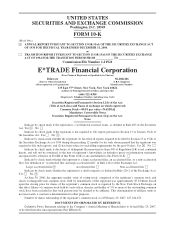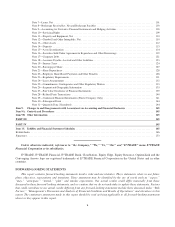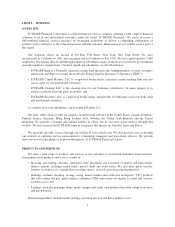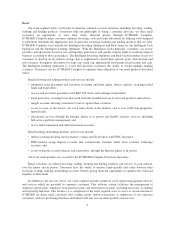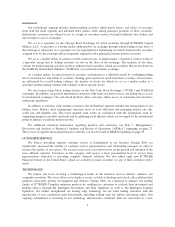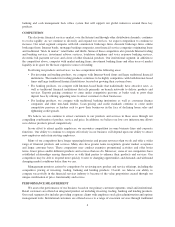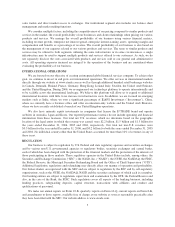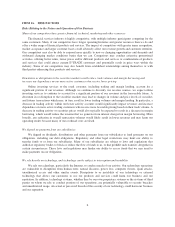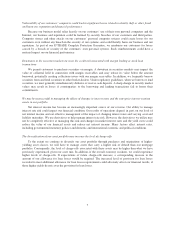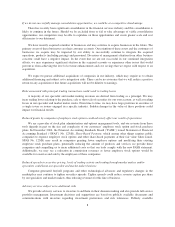eTrade 2006 Annual Report Download - page 11
Download and view the complete annual report
Please find page 11 of the 2006 eTrade annual report below. You can navigate through the pages in the report by either clicking on the pages listed below, or by using the keyword search tool below to find specific information within the annual report.If we do not successfully manage consolidation opportunities, we could be at a competitive disadvantage
There has recently been significant consolidation in the financial services industry and this consolidation is
likely to continue in the future. Should we be excluded from or fail to take advantage of viable consolidation
opportunities, our competitors may be able to capitalize on those opportunities and create greater scale and cost
efficiencies to our detriment.
We have recently acquired a number of businesses and may continue to acquire businesses in the future. The
primary assets of these businesses are their customer accounts. Our retention of these assets and the customers of
businesses we acquire may be impacted by our ability to successfully continue to integrate the acquired
operations, products (including pricing) and personnel. Diversion of management attention from other business
concerns could have a negative impact. In the event that we are not successful in our continued integration
efforts, we may experience significant attrition in the acquired accounts or experience other issues that would
prevent us from achieving the level of revenue enhancements and cost savings that we expect with respect to an
acquisition.
We expect to pursue additional acquisitions of companies in our industry, which may require us to obtain
additional financing and subject us to integration risks. There can be no assurance that we will realize a positive
return on any acquisition or that future acquisitions will not be dilutive to earnings.
Risks associated with principal trading transactions could result in trading losses
A majority of our specialist and market-making revenues are derived from trading as a principal. We may
incur trading losses relating to the purchase, sale or short sale of securities for our own account, as well as trading
losses in our specialist and market maker stocks. From time to time, we may have large positions in securities of
a single issuer or issuers engaged in a specific industry. Sudden changes in the value of these positions could
impact our financial results.
Reduced grants by companies of employee stock options could adversely affect our results of operations
We are a provider of stock plan administration and options management tools, and our revenue from these
tools depends in part on the size and complexity of our customers’ employee stock option and stock purchase
plans. In December 2004, the Financial Accounting Standards Board (“FASB”) issued Statement of Financial
Accounting Standard (“SFAS”) No. 123(R), Share-Based Payment, which among other things requires public
companies to expense employee stock options and other share-based payments at their fair value when issued.
SFAS No. 123(R) may result in companies granting fewer employee options and modifying their existing
employee stock purchase plans, potentially reducing the amount of products and services we provide these
companies and compelling us to incur additional costs so that our tools comply with the new FASB statement.
Additionally, we may see a reduction in commission revenues as fewer employee stock options would be
available for exercise and sale by the employees of these companies.
Reduced spreads in securities pricing, levels of trading activity and trading through market makers and/or
specialists could harm our specialist and market maker business
Computer-generated buy/sell programs and other technological advances and regulatory changes in the
marketplace may continue to tighten securities spreads. Tighter spreads could reduce revenue capture per share
by our specialists and market makers, thus reducing revenues for this line of business.
Advisory services subject us to additional risks
We provide advisory services to investors to aid them in their decision making and also provide full service
portfolio management. Investment decisions and suggestions are based on publicly available documents and
communications with investors regarding investment preferences and risk tolerances. Publicly available
8

